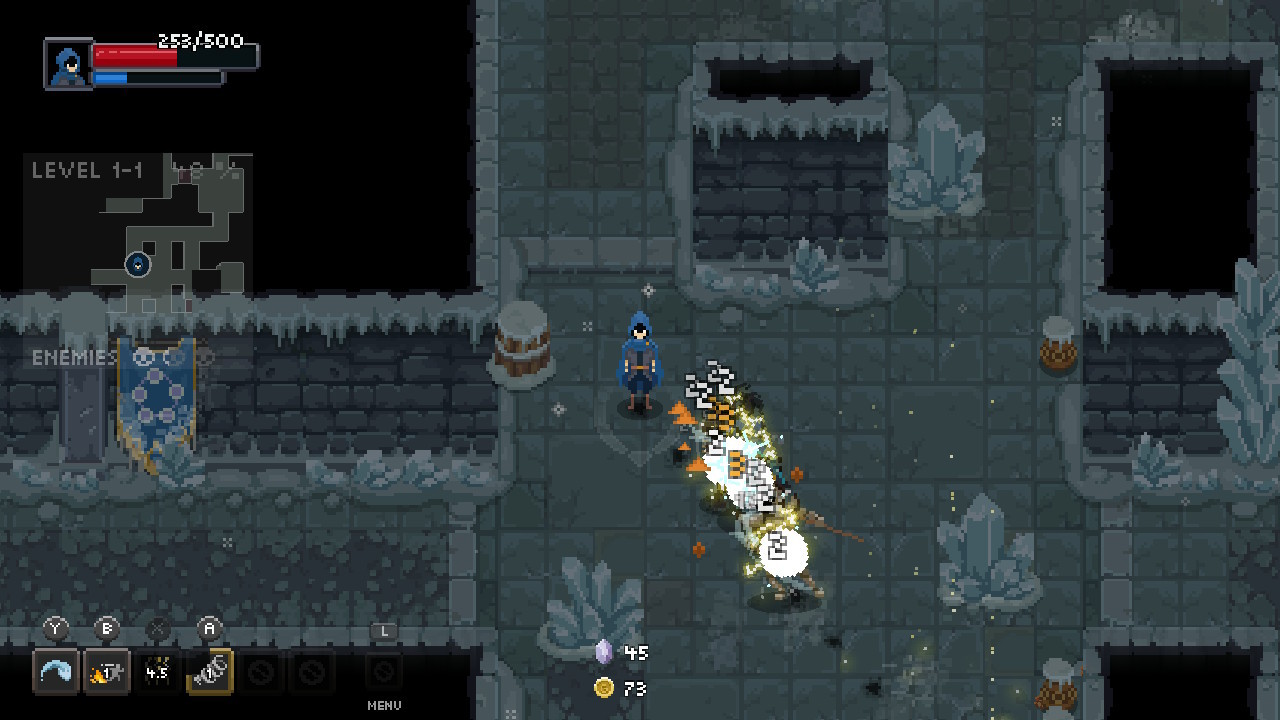Roguelike pixel-art games are so common that it almost feels like a cliché. Without a great hook, many of these would-be indie hits wind up lost among ever-filling digital storefronts. However, Wizard of Legend, despite a painfully generic title, manages to distinguish itself from its peers with fast, challenging gameplay. Despite a few missteps, it successfully delivers an engaging and endearing experience.
After a breezy tutorial framed as a series of interactive wizard museum exhibits, you finds yourself whisked away into a new dimension–one with an ever-changing, multi-floor dungeon inhabited by three all-powerful wizards. The challenges you face in this dungeon are called the Chaos Trials, and only wizards of truly exceptional skill have ever conquered them…meaning, of course, that you need to become a wizard of exceptional skill.








Your wizard character has animpressive moveset, with a basic melee spell, a dash/dodge spell, and two powerful techniques with cooldowns mapped to each of the controller’s face buttons. While a lot of roguelike games focus on smart usage of the random resources you find on any given run, Wizard of Legend’s emphasis is more on skill-based action gameplay. By using your spells and movement skillfully, you can create powerful combos, stunlocking enemies with a flurry of melee attacks, ranged magic, and dashes. The fast, fluid movement of your character and timing-based combos make Wizard of Legend feel like classic action-RPGs of yore–a welcome change from the generally slower rhythm of similar procedurally-generated games.
Finding and learning new arcana magic inside and outside of the dungeons can also affect your gameplay; you might have acquired a really cool and powerful spell, but it’s practically worthless if you don’t learn to use it well in tandem with your other skills. The process of experimenting with the magical combinations you acquire–and augmenting their effectiveness with various artifacts–allows you to personalize your wizard’s playstyle to suit your strengths. Just don’t get too attached to the spells and items you find inside the dungeons–most of those won’t be coming home with you after death.
As you make your way through the Chaos Trials, you’ll encounter a variety of obstacles, enemies, places of interest, and treasures scattered throughout the catacombs. Defeating enemies and collecting treasure chests yields gold and gems; gold can be used to buy goods and services within the dungeon, while gems stay with you even if you’re defeated and allow you to buy new spells, clothes, and artifacts in the shopping area before a new run. Only the goods purchased outside of the dungeon are permanent–with a few rare and valuable exceptions–making hunting for and collecting gems an important part of exploration. That doesn’t make gold worthless, however, as you can use it to purchase temporary upgrades, health restoration, and additional, powerful spells. Yes, you’ll lose all the stuff you bought with gold if you perish, but these skills and items can help make a run last a lot longer, which means more potential permanent loot in the long term. It never feels like a serious setback when a run goes bad; you just buy a few goodies, practice your new arcana, and jump back into the game.
It’s plenty of fun, but there are a few annoyances. The environments are dull and lack visual variety, and in some cases it’s hard to discern what things are due to the colors used and a lack of detail. The dialogue, sparse as it is, also feels like it’s trying just a bit too hard, particularly when it goes for lousy puns. It’s also an unforgiving game for newcomers, as enemies are relentless straight from the get-go, making the learning curve steep. But no matter how good you are, sometimes you’ll just get a really terrible, unescapable battle in a room filled with hazards and projectile-slingers that feels like it’s there simply to ruin your run. While the randomness in Wizard of Legend feels like less of a run-killing factor than in other games of this sort, when its RNG decides it doesn’t like you, you’ll know it.








With a buddy, however, things get easier. You can play local co-op with a friend, with the both of you sharing a common pool of permanent items and arcana picked up from all your runs up to that point. Having two players makes the more difficult enemy encounters and combo challenges feel less overwhelming, and a generous revival system that involves picking up energy from defeated enemies lets a fallen player hop back into the action fairly easily. However, one major fault is that both players must occupy the same quadrant of the screen, which makes for restricted movement in certain situations–like when one player is working to get in for melee strikes while the other is trying to zip around to set up ranged skills. Giving the camera the ability to zoom out during these situations would have been nice. (Also, as of this writing, you can only play local co-op on the Switch using the Joy-Cons, so forget about using that Pro Controller when your friend’s over.)
Overall, though, there’s a lot to love about Wizard of Legend. While it does have some issues, the cycle of exploration, discovery, failing, learning, and exploring again will keep your determination to conquer the Chaos Trials high. Wizard of Legend might not look like much on the surface, but there’s some good magic underneath.
Website: LINK


